jesse-eisenberg-interview
147 posts
All about Jesse Eisenberg.
Don't wanna be here? Send us removal request.
Text
A list of Jesse Eisenberg's writing
I made a list of Jesse Eisenberg's writing.
2009
NOV 30 Manageable Tongue Twisters.
2010
FEB 24 Marxist-Socialists Jokes
2011
JUL 21 A Post Gender Normative Man Tries to Pick Up a Woman at a Bar
DEC 07 ACTOR & PLAYWRIGHT JESSE EISENBERG ON THE THRILL OF THE STAGE
2012
JAN 25 Courage Is Just an Act
FEB 15 Jeremy Lin Has Helped Me Through Some Pretty Tough Times
MAR 12 Jesse Eisenberg on His Lifelong Aversion to Youth Culture
MAY 24 Sushi Nozawa
JUN 06 Masgouf
JUL 09 The Whiskey Blue Bar at the W Hotel
AUG 01 TCBY
AUG 20 Robert Frost Elementary School Cafeteria
OCT 02 Organix vs. the San Gennaro Street Festival
NOV 21 Thanksgiving With Vegans
DEC 11 Body Rituals Among the Lauxesortem
2013
FEB 22 Matthew’s House
MAR 17 Marv Albert Is My Therapist
APR 15 The League, Passed Down
APR 17 I Didn’t Win Any Pulitzer Prizes This Year
APR 25 A Marriage Counselor Tries to Heckle at a Knicks Game
JUN 03 Fuddruckers and an Unreliable New Friend
JUN 24 Separation-Anxiety Sleepaway Camp
AUG 06 A Crawfish Boil and Dad’s New Family
SEP 09 A Bully Does His Research
OCT 02 A Post Gender Normative Woman Tries to Pick Up a Man at a Bar
OCT 07 Final Conversations at Pompeii
NOV 01 The Museum of Natural History and Making Compromises
NOV 12 Alexander Graham Bell’s First Five Phone Calls
DEC 12 The Ashram and Mom
2014
JAN 20 If I Was Fluent in . . .
JUN 10 Carmelo Anthony and I Debrief Our Friends After a Pickup Game at the Y.M.C.A.
2015
MAY 25 Men and Dancing
SEP 01 My Nephew Has Some Questions
SEP 09 My Spam Plays Hard to Get
NOV 22 THE GUY WHO HATED NOW YOU SEE ME, A SHORT STORY
NOV 23 An Honest Film Review
2016
JAN 27 What Do You Do When Your Mother Won’t Shut Up at The Ballet?
FEB 04 Act Like You Know
FEB 12 Why I Broke Up with the Little Mermaid
MAY 19 My Cousin Recently Became A Realtor
NOV 04 SELF-DEPRECATING HEROES
DEC 11 LOW TALK IN HIGH PLACES
2017
JAN 23 YOU NEVER REALLY KNOW
JAN 25 My Very Good Friend
FEB 01 发现肉——致中国读者
MAR 04 HAVE YOU DINED WITH US BEFORE?
NOV 14 Mongolia
2018
JAN 15 Sad Stuff on the Street
MAR 20 Thanks, Giving
MAY 14 My N.B.A. Knowledge Comes In Handy
MAY 18 One Small Blow Against Encroaching Totalitarianism: The Natural Order of the World Depends On It
MAY 31 Jesse Eisenberg on the Relentless Work Ethic of Philip Roth
DEC 05 The Cast Members and Their Crew
2019
JAN 03 MY SISTER PUSHES THE LOBSTER
NOV 21 My Two-Year-Old Requests Just One More Song Before Bed
NOV 23 Jesse Eisenberg: Recommends four contemporary plays
2021
MAR 02 Writer Courtney Zoffness and Jesse Eisenberg on the Radical Compassion of Art
2022
NOV 07 Content Warning
2023
FEB 20 A G.P.S. Route for My Anxiety
21 notes
·
View notes
Text
Jesse Eisenberg Describes Fleishman Is in Trouble's Many Sex Scenes
Jesse Eisenberg shares how the sex scenes in FX's Fleishman Is in Trouble were filmed, calling it an "incredibly uncomfortable" experience.
Actor Jesse Eisenberg has revealed the work that went into shooting Fleishman Is in Trouble's many sex scenes.
In an interview with Total Film Magazine, Eisenberg shared that filming the numerous sex scenes in the FX on Hulu series was an awkward process because of how technical it was. He likened the experience to shooting an action scene, where a vast amount of filming is done for a mere 20-second scene due to the various elements that have to be captured on camera.
"It was incredibly uncomfortable," Eisenberg said of Fleishman Is in Trouble's love scenes ahead of the series' United Kingdom premiere on Disney+. "It's very technical. Like when you do an action scene. It takes forever. You'll shoot a 20-second scene over the course of three days, because there's tiny little pieces that they have to get. So the action scene that is fun to watch is not fun to film. Similarly with sex scenes. It's this incredibly technical, process-oriented experience."
Eisenberg then went on to describe how he managed to film a scene without any clothes on, given that he has been battling anxiety since he was a child. While the fact it was a closed set did help, the actor explained it did not change the fact that the sex scenes would eventually air on television for all to see. "We did have a closed set," he said. "But a closed set means they put some curtains around the scene, so no one can see, but you also know that it's being filmed on multiple cameras. You're filming it for a TV show -- there's no amount of 'closed' that they can make a set that's going to be on TV."
Based on Taffy Brodesser-Akner's 2019 novel of the same name, Fleishman Is in Trouble follows the recently divorced Dr. Toby Fleishman (Eisenberg), who begins using dating apps for the first time. Everything changes, however, when his ex-wife, Rachel (Claire Danes), vanishes without a trace, leaving him alone with their children. While trying to balance raising his kids, his job and all the women in Manhattan, Toby soon finds that he will not be able to untangle the mystery behind his wife's disappearance until he can be more honest about what happened to their marriage. Alongside Eisenberg and Danes, the show also stars Lizzy Caplan as Libby, one of Toby's best friends and the narrator of the story, and Adam Brody as Seth, another one of Toby's close friends.
All eight episodes of FX's Fleishman Is in Trouble are available to stream on Hulu. The show is slated to premiere on Disney+ in the United Kingdom on Feb. 22.
SOURCE
3 notes
·
View notes
Text
Jesse Eisenberg's Midlife Crisis Awaits
The Fleishman Is in Trouble star talks marriage, gender roles, and that unexpected ending.
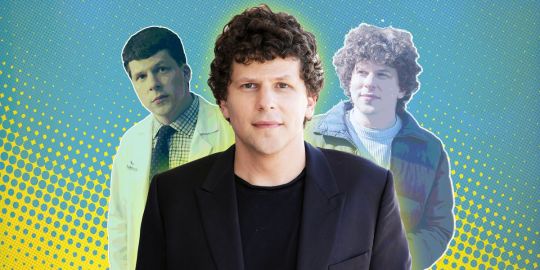
At the beginning of Fleishman Is in Trouble, the show is seemingly about a guy getting through a divorce. There's the introduction to dating apps; the reconnection with old friends; the flashbacks of misery. But as you continue watching, it becomes clear this is not a divorce show. Toby Fleishman, a 41-year-old Jewish hepatologist, is also having a midlife crisis. How the hell did he get here? And why him?
His anxiety is palpable. The furrowed eyebrows, excessive blinking, and longing stares are all it takes for viewers to side with a man whose dream of a happy marriage and family is no more. When producers suggested that Jesse Eisenberg play the lead role of Toby, a lightbulb went off for Taffy Brodesser-Akner, who wrote the New York Times bestselling novel that inspired the series and serves as its showrunner and executive producer. It was Eisenberg or bust. “Once it was him in our hearts, anyone else would have been a letdown,” Brodesser-Akner tells Men’s Health. “He is, I believe, the most gifted actor of his generation.”
A gifted actor who’s also a “rare bird,” according to Brodesser-Akner. Rare in the sense for someone to be quick and smart and funny and warm without succumbing to the cynicism that usually breeds from his kind of intelligence (“I’m cynical, it’s just directed inward,” Eisenberg jokes). Rare in the sense that when he calls me directly for this interview in the midst of a seven-hour road trip with his family, he mentions my area code and asks if I’m in Boca Raton (close), then proceeds to ask me questions about my hometown and tell me he has a cousin who went to high school nearby.
Before Eisenberg signed on to the show, that same inquisitiveness led him to buy Brodesser-Akner’s novel on iBooks (yes, iBooks) when he “heard something amazing about it.” But then he heard that Brodesser-Akner was a culture writer and known for profiling celebrities à la Tom Hanks, Bradley Cooper, and Gwyneth Paltrow (“The thing I avoid reading about most in life”). He thought that was what the book was about, so he didn't open it. Cautious curiosity, after all. It wasn’t until he found out Fleishman was being adapted for television and they wanted him for the role that he finally opened it. “Then I read it and devoured it like everybody else in New York at the time and I'm now all caught up.”
Upon Fleishman's eighth and final episode, the FX limited series (currently streaming on Hulu) has an 83 percent rating on Rotten Tomatoes, thanks to its prolific writing and ensemble cast of Eisenberg, Claire Danes, Lizzy Caplan, and Adam Brody. It’s proven to be a masterclass in perspective-shifting storytelling, while also exploring themes of gender, class, desire, and ambition. You'll relate to "the quiet part out loud" moments—even if you’ve never been married or have no plans to be. As the series comes to a close, Men’s Health caught up with Eisenberg to discuss what it was like living in Toby's world, why he refuses to watch himself on-screen, and the fate of Toby and Rachel.
Men's Health: What initially attracted you to the role of Toby?
Jesse Eisenberg: Well, it's a guy who was a little older than me going through what, for him, felt like the end of the world, which is, as an actor, what you want because what you learn in drama school is to live in high stakes. But what I really just loved about the show was that it also took a step back and put his problems in perspective, both from a place of gender that we as an audience are expected to feel a male sympathy that is perhaps not fully earned. And then also just from a place of basically viewing his great fortune in a pretty culturally-aware context. He talks about feeling like he's treated like a poor person, and yet we as readers or as an audience for the show know that he's in a very privileged bubble. So there's a self-awareness to the show while at the same time providing me, an actor, with very high stakes.
I read that you had an anxiety disorder growing up. I’m curious to know if and how you were able to draw from this experience while portraying Toby’s anxiety on screen?
Anytime you're acting in anything, you're typically dealing with some kind of emotional stress. That's just the nature of drama and characters. Actually, I thought this character is about a thousand times more confident and self-actualized than I am. In fact, I would often try to make these little aside jokes in the way I, Jesse, would in my own life to cope with an uncomfortable situation. And Taffy [Brodesser-Akner], who wrote the book and the character, told me he's not like that. He doesn't have the same kind of immediate anxiety and need for coping like I do.
So often eating disorders portrayed on-screen are reserved for female characters. Talk to me about the significance of depicting Toby’s eating disorder and what that process was like?
That was really interesting for me. My relationship to eating disorders is that I had gone to many Overeaters Anonymous meetings with somebody who's close to me for years. You learn very quickly that eating disorders are not just reserved for women, so I was aware of that. Then my other relationship to eating disorders comes from this movie that I did just prior to filming Fleishman Is in Trouble. A month before we started filming, I was playing an amateur bodybuilder who basically force-feeds himself all day. I had spent a year training for the movie with a personal trainer and a dietician to try to gain a lot of weight and muscle. I had spent that year, in terms of my relationship with food, just very frustrated because it's very difficult for me to gain weight. Then the movie ended and I shifted to playing this character who was restricting [with food], so the exact opposite. It was interesting to play this character after thinking about food in a very stressful way for a year.
My relationship to food is a relatively healthy one now. When I'm working I'm very careful about what I eat, but only because I don't want to change my energy level during the day. You shoot for 12 or 14 hours a day, you want to maintain that consistent level of energy. So I don't eat sugar, and I have a very limited amount of caffeine that I proportion out throughout the day.
People have #thoughts on Toby’s dating life (Twitter is mainly just in awe that a nebbish-y, 40-something Jewish man is in his sexual prime). What was it like filming the sex scenes? You were actually nude for one of them, right?
[I'm] working on this show about gender politics—a show which tries to upend thoughts we have about male sympathy—and yet I had to do these sex scenes where the women were definitely going to be naked and it was questionable as to whether I was going to be. I spoke to Taffy and she said, “This is what we're thinking. Are you okay with also being naked?” And my first thought was, let me just ask my wife because I don't have an immediate thought or answer that feels exactly right to me. I presented the situation to my wife and she had one question. She said, “Are the women going to be naked?” I said, “Yes.” And then she said, “Well, then of course you have to.” And I thought, not only is she right, but that's what makes sense for a show about gender politics, that the show doesn't just objectify women.
Speaking of sex and dating, I know you don’t use social media, but have you used dating apps before or were you essentially as clueless as Toby?
In terms of the character's dating life, it's not something that I ever experienced or know about in terms of going online and combing through the dating industry. I thought [it] could not be real when I read about it. And then in talking to people about this show before filming it, they started opening up to me about their dating lives. It was straight women showing me basically dozens and dozens of pictures of men in front of yachts that I'm sure they don't own or go on, and it floored me. I'm a person who doesn't really love options, and to me it would just seem overwhelming.
Fast forward to episode seven, where Claire Danes gives this masterful performance of Rachel’s nervous breakdown. Do you remember watching that episode for the first time? If so, what were your thoughts?
I have not seen a frame of the show. I can’t look at myself. But I read it, obviously, and we did a table reading of it, so I know everything that happens in it.
Is that unique to Fleishman or all of your work?
Oh no, I don't watch myself, ever. I mean, I saw the commercials. The way I can compare my feelings about it is just like, if you go on a trip and then you come back with 100 pictures, you're most likely going to delete 90 of them because you think you look weird. And that's pretty much how I feel about watching myself. I think 90 percent of it is horrible and 10 percent is something I'm happy with. It’s just an excruciating experience to watch myself. But I know that episode well and I loved it and I thought it was just the best.
That episode was of course the first time we learned of the divorce from Rachel’s perspective. What is the subtle messaging around misogyny and feminism that you think people may miss while watching the series?
It's one of these great things that happens in drama where you bring an audience into a story, and then flip the story on its head, and then the audience realizes they've been complicit with something that they now regret. So in the case of this show, the audience is most likely on Toby's side. From his perspective, Rachel looks driven by avarice and ambition, and she seems like a negligent mom and an uninterested wife. That episode reminds the audience of something they probably know, but forgot, which is that every story has two sides. That every person has their own way of looking at something that's just as valid as their adversary. It turns the show from a show that's entertaining into a show that’s profound and instructive.
I loved this line from one of the episodes: “To survive is to evolve, to evolve is to move forward, and to move forward is to recover.” Was there a specific line or scene that resonated with you most?
Oh yes, yes, yes. The scene that resonated with me the most was in episode six, where I go to these two parties. One is a party of Rachel's friends at our new fancy apartment, and the other is a party [with] my old friends. I thought it was amazing in so many ways. On the one hand, it showed the way a character can live in these two lives and accidentally have found himself in a life that is completely unsatisfying to him. I think that could be felt universally, which is just the idea that through making decisions that go one percent in a certain direction every day, you wind up 100 percent in a completely different direction than you had planned.
And then the other thing I think it shows so well are these two sides of New York City that I am a part of. Because I'm in the arts, I'm really part of what I would think of as a more bohemian creative scene. And yet, because I am also in mass entertainment, I find myself also in these very expensive rooms and feel obviously very out of place. But these two things really do exist side by side. And oftentimes there's an overlap of people who will be in both worlds, and I thought that episode captured that so beautifully.
In that final scene, what happens with Rachel and Toby? Does he go back to her? Yell at her to oblivion?
Yeah, I don't know. I'm reminded there was...in the end of the book, where the wife comes back and...I'm so sad it gets me choked up. She comes back to him and she's like, "It's me. It's just me." Basically, somebody you have a history with almost irrespective of the hell you've put each other through, that history still means something. And the question is, what does it mean? Does it mean that there's enough lingering feeling to warrant trying again? Or does it mean that there's so much resentment that the relationship will never be solved?
So, does the show reject marriage or accept it? Considering all three friends ultimately either enter or return to marriage, what does that say about the institution of marriage? Is the lesson simply that it’s flawed? Fleeting?
I think there's a line in the show that "marriage is like democracy. It's the worst form, except for all the others." I guess the thesis of the show is that if we're going to live in this world with these norms, marriage can work and be a really important way to live. But I don't know, obviously for a lot of people it doesn't work. So I don't know if the show is making a blanket statement, but at least for these specific characters it feels right.
You are, from what I understand, a happily married man. After filming this series, does any part of you now question the institution of marriage and its potential consequences?
When you're acting in something, it allows you to live out, in a protected way, the alternate lives that your character is living. So with this I got to, in a safe way, live out the life of what it's like to date on these apps and think about that. It became very quickly unappealing to me. Similarly, living out the life of having a marriage that dissolves and not only dissolves, but dissolves with such a rancor and bitterness...that also is not appealing to me. Claire and I, as actors, got to live out that experience and then go home to our partners with whom we are happily married, and realize that we are lucky. This is something we both discussed—that we both felt lucky at the end of the day that we went home to relationships that were not fraught with the same anger and resentment.
What can other men watching this show learn from Toby, especially those who are currently going through a midlife crisis?
Toby is a guy who prizes, above all else, stability. So to see somebody who has prized and held on to stability over everything else go through a very shaky time is probably cathartic for a lot of people. Because you realize that this kind of instability doesn't just happen to people who are irresponsible. For a lot of people, when they end up going through a chaotic experience, they often assume it couldn't have happened to them. Toby is the last person who ever expected it to happen to him.
Have you gone through a midlife crisis yet?
I think I did when I was 13 because I was very mature. When I was young, [I was] just questioning everything. But I guess you can't call that a midlife crisis because it didn't have to do with age and thinking life was behind me. So no, I guess not.
You’re one of the lucky ones.
Well, there’s still time.
SOURCE
22 notes
·
View notes
Text
Jessie Eisenberg and Claire Danes Talk FX's 'Fleishman Is in Trouble'
Moviefone speaks with Jessie Eisenberg and Claire Danes about 'Fleishman is in Trouble.' "What's amazing about the show is it switches perspectives," the actor said.
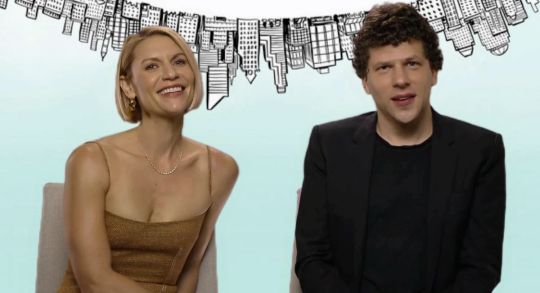
Premiering on FX on Hulu beginning November 17th is the new series 'Fleishman Is in Trouble,' which is based on the novel of the same name as Taffy Brodesser-Akner.
The series stars Jessie Eisenberg (‘Batman v. Superman: Dawn of Justice') as Toby Fleishman, a recently divorced doctor who is new to the world of dating apps. But when his ex-wife Rachel (Claire Danes) disappears, leaving him alone with his kids, he realizes that he will never find out what happened to her if he doesn’t first examine what happened to their marriage.
In addition to Eisenberg and Danes, the series also features Lizzy Caplan (‘Cloverfield’), Adam Brody (‘Shazam!’), Josh Radnor (‘Liberal Arts’), and Christian Slater (‘True Romance’).
Moviefone recently had the pleasure of speaking with Jessie Eisenberg and Claire Danes about their work on 'Fleishman Is in Trouble,’ the story, their characters, and taking their work home with them.
Moviefone: To begin with, Jessie, can you talk about how Toby is dealing with his divorce? It’s not going the way he expected, is it?
Jessie Eisenberg: Yeah, exactly. Nor did the marriage. It's kind of like when you're married, and your hope is that you'll be a single unit, that not only it never disintegrates, but that you'll kind of flourish as one. But for Toby, he was so rigid in what he wanted her to be, that he could be nothing except disappointed. Toby is first attracted to Rachel because she is self-possessed, ambitious in an interesting way, and she stands up for herself and he sees in her an amazing, stable life partner.
But then what he sees happen is all of those great qualities become exaggerated in her, that she becomes ambitious to a fault, that she neglects the family, that she becomes so self-determined and so self-reliant that she doesn't need us and kind of severs an emotional connection. So, it's all of these things that seemed at the onset as wonderful assets turn into something that he considers toxic and unsustainable. What's amazing about the show is that it also switches perspectives and you see the show from her angle. Then you see that actually his assessment of her is completely coming from his own rigid sense of a narrow worldview and narrow set of ethics.
MF: Claire, do you think Rachel is misunderstood? How would you describe your character?
Claire Danes: Sure, I mean, she's misunderstood to herself too. Toby doesn't have X-ray vision. Even if you were an actual analyst doctor, it's very hard to see your partner clearly. But I think she doesn't know how much trauma she's carrying and neither does he. So, neither of them knows that this ambition is also a coping mechanism, and is as largely to do with her not fleeing from a lot of pain and she wasn't sufficiently loved. She's found ways of managing that, which seem very impressive, but are actually kind of feeble.
So yes, they both can't outrun it indefinitely. She can't. This is the outcome, and it's gory and it's graphic, and it's very unpleasant. But hopefully they are able to see themselves more clearly, and sadly they can only do that outside of the relationship.
MF: Finally, as actors, do you ever have the experience where you go home and realize you are still acting like your character? Do you ever accidentally take your work home with you?
CD: Definitely. I think because we were arguing, we were bickering incessantly on set and there's something kind of infectious and addictive about that. It's almost like cursing, you can't turn it off. So, occasionally I'd come home and be in a combative mode just because I had been doing those drills all day long. I'd been sort of conditioned to be in that mode. The characters are definitely mired in that pattern.
SOURCE
0 notes
Text
Jesse Eisenberg and Claire Danes on 'Fleishman is in Trouble' and Its Unique Exploration of Relationships
Eisenberg also shares his "overwhelming" experience with dating apps for research, & Danes gives more insight to her character Rachel.
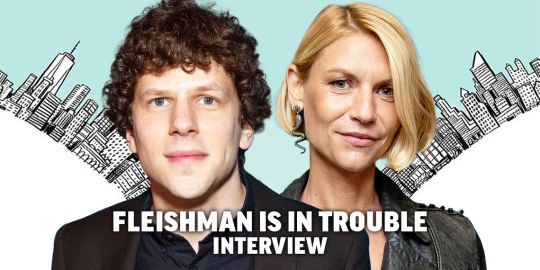
Created for television by Taffy Brodesser-Akner, who adapted her acclaimed novel of the same name, the eight-episode FX original series Fleishman is in Trouble (which is available to stream at Hulu), follows Toby Fleishman (Jesse Eisenberg), a recently divorced single dad of two, an 11-year-old daughter and nine-year-old son, who’s navigating the world of app-based dating, rekindling friendships with Libby (Lizzy Caplan) and Seth (Adam Brody), and learning unexpected things he never knew about his wife, Rachel (Claire Danes). As he attempts to understand how his marriage fell apart in the first place, he must also move forward and find a new balance between parenting, career success, and personal fulfillment.
During this interview with Collider, co-stars Eisenberg and Danes talked about how they related to their characters, what Eisenberg learned about dating apps during his research, how Rachel needed to come to terms with her root trauma in order to become more self-possessed, that learning about both sides of this relationship provides a much fuller awareness of their experiences, how the shoot resulted in Eisenberg getting COVID, and how playing characters that aren’t that far off from you can more easily bleed into real life.
Collider: As actors, I would imagine that you sign onto projects that you connect with in some way, whether it’s something with a story or with a character that you want to explore. What was it that got you most interested in this and made you want to take on what you would have to take on with this character?
JESSE EISENBERG: Yeah, I felt like I could relate to Toby’s experience so well, and I just loved his righteousness. He’s somebody that’s not only in the throes of a horrible divorce, but somebody who, even before that, thinks that his ethical rubric is exactly right, and I just love that. It’s something I aspire to, to have the confidence of one’s own ethics. It’s something that’s similar to me, but different enough that I can imagine how I would be in those circumstances. But what I most loved about this story, from an outsider’s perspective, is just the way it talks about marriage from these different perspectives. So, the first part of the show, you’re seeing this breakdown of this horrible marriage from my character’s perspective. You think, “Wow, this guy is the hero, and his wife is just this miserable, toxically ambitious, neglectful partner.” And then, the show shifts, and you see that what you’ve actually been seeing is so skewed and based in an antiquated narrative about male sympathy. I just thought that was brilliant.
CLAIRE DANES: Yeah. Similarly, as a 43-year-old married woman of two who lives in New York City, it was hard not to relate to what was on those pages, but I thought it was a very surprising exploration and interrogation of a relationship. It had this kaleidoscopic quality because you got to experience it from so many different vantage points.
Jesse, because your character is divorced, he decides to put himself out there with dating apps. You’ve talked about how that’s not an experience you had, so did you do any kind of research about that or talk to friends? It seems like you’d be able to find a never-ending amount of horrible experiences from people.
EISENBERG: Yes, it blew my mind. What’s amazing about being an actor is that you can just tell people, “Hey, I’m doing a show about this, can I see your Match profile,” or whatever, and people allowed me to look through the thing because I was doing the show, and they knew what it was about. It’s just so overwhelming. It terrified me, especially as somebody who values their privacy. Because of the nature of my work, I value my privacy so much. To then see people having to put so much personal information out there about themselves and make themselves so vulnerable by saying, “Please, I’m looking for a partner.” You’re overwhelmed by it. And when my character, who’s been this married guy that’s lived in what he thought was a very stable relationship, he enters into this world, and it just overwhelms him. He starts to indulge in it, and then soon thereafter, he finds it to be this uncomfortably monotonous, uneventful, unhappy world.
Claire, one of the things that I found interesting about Rachel, and about watching your performance, is that we see how profoundly fractured things have become for her, but how she always presents herself as able to handle it all. Do you feel like she even had herself convinced? Did she know how broken she had become?
DANES: No, she had no idea. She was very disconnected from the root trauma, and I think that trauma had been activated at different points in her life. She was thrown, but never fully, so she certainly didn’t resolve the problem. She poked the bear. It roared, and she retreated into coping mechanisms, and she doubled down on the tools that had helped her when she was overwhelmed, as a little girl. She became that much more self-possessed, and much more doggedly ambitious and myopic. That was effective for a while, but eventually, it’s exposed as being fairly flimsy, and she completely falls apart, which is harrowing and tragic, but hopefully essential in allowing her to finally face the big beast. I would like to imagine that she is better for it, but it’s just so sad that they couldn’t do that together and that she had to do it alone.
As the one that was exploring her from the inside, how do you feel about the way the audience will learn about Rachel and get to know her?
DANES: The construction of the story is true to the book. We have to spend a lot of time with her, as seen by Toby, and that is a very unflattering portrait. You just have to trust that the audience will stay with her long enough to finally discover what’s underneath that cold exterior. She is alienating, for a very long time.
Jesse, one of the stand-out moments, for me, in this whole rollercoaster of emotion, came after Toby had to take his kids out of camp, and they were driving home. What was it like to do that scene in the car, when the kids are singing “Fight Song” and you’re listening to them singing together? How many times did you have to hear them do that?
EISENBERG: Well, that wasn’t the bad part. The bad part was that was the scene where I got COVID.
Oh, God.
EISENBERG: Yeah, in that car, in that scene, from that singing. So, what I remember most, so much, is not the monotony of that song. In fact, I think my memory was affected by the COVID that I got in that scene, so I don’t remember the song.
DANES: You really got COVID in that car?
EISENBERG: In that scene, in that car, on that day. (To Claire) I can tell you how I know that after. But I loved the camp stuff, taking the kids out of camp and standing up for my daughter. It was so sweet. I have a young child, so this was a little role-playing of how to stand up for the kids and what’s too much. And the kids in the show are so wonderful. They’re so great and sweet.
DANES: But they did give you COVID.
EISENBERG: I’m not saying who I got it from. I’m just saying it happened in that scene, in that car, on that day.
DANES: They are wonderful. They're so gifted. What was asked of them was pretty intense, and they just delivered effortlessly, every time. They’re sweet kids who are very talented.
When you play characters like this, do you think about what could happen to them, after you finished with them, or do you just leave them behind when you’re done playing them?
EISENBERG: When the characters are pretty close, but not exact, it’s confusing. When you’re playing a character that’s pretty extreme, you don’t relate it to your own life. This was interesting role-play. It’s hard to describe. It feels like drama school or something. When you play a character that’s similar enough, it’s confusing. My character is pretty self-righteous and not self-aware. Taffy [Brodesser-Akner] writes in the story that Toby would come close to being self-aware, and then run screaming from it. I think I became that, a little bit. Claire and I probably both felt it. When you’re bickering on set all day with each other, in a way that is not that markedly dissimilar from a conversation you might have with your significant other, that little thing infects, and it doesn’t feel that dissimilar. I don’t view my wife in any of the same way Toby views Rachel, but I would go home and say certain things that overlapped with the thing I said for 12 hours on set.
DANES: You fall into the habit of a certain pattern. It becomes a little infectious and not a great thing to bring home.
Fleishman is in Troubleis available to stream at Hulu.
SOURCE
0 notes
Text
Claire Danes & Jesse Eisenberg Interview: Fleishman Is In Trouble
Claire Danes and Jesse Eisenberg talk playing divorcing couple Rachel and Toby Fleishman in FX's limited series Fleishman is in Trouble.
In Fleishman is in Trouble, Claire Danes and Jesse Eisenberg are in crisis. Danes' Rachel Fleishman has ghosted her ex-husband, leaving their kids with Eisenberg's Toby Fleishman who is trying to navigate the New York City dating scene as a divorcee. With two kids in tow, that's a little more difficult. But what starts as a minor inconvenience becomes a deep dive into a marriage that failed both husband and wife, who in turn failed each other.
Based on Taffy Brodesser-Akner's novel of the same name, Fleishman is in Trouble also stars Lizzy Caplan and Adam Brody as two of Toby's college friends who help him navigate the complex situation at hand. The eight-episode miniseries premiered its first two episodes on November 17, with six more to follow.
Ahead of the premiere, Screen Rant sat down with Danes and Eisenberg to discuss Fleishman is in Trouble, including how they became comfortable portraying such a complicated marriage and Toby and Rachel's love for each other.
Claire Danes & Jesse Eisenberg On Fleishman Is In Trouble
Screen Rant: Claire, you guys are depicting such an intense wild marriage. Did you and Jessie know each other before? And how did you guys kind of build up the relationship to be comfortable?
Claire Danes: We had met briefly before, but just one time, so we didn't have a huge sense of each other. We had huge cast dinners before we began rehearsing, and that was helpful. Our rehearsal process was pretty concentrated but very effective. But I have to say I had an immediate kind of rapport and kind of shorthand with this fine fellow. So it didn't take much cultivation or effort.
Jesse Eisenberg: Yeah, it was absolutely pleasurable and immediately comfortable and engaging. A wonderful experience, because she's the best. And she's so smart, thoughtful, and talented. Yeah, it was great. And then we also had, the woman who ran the show [Taffy Brodesser-Akner] is the woman who wrote the book. And so there was this very integrated relationship between the TV series and this incredibly specific, lengthy book, which talked about everything that happens in the series, but in a way that was kind of immediately resonant and emotional, and at greater length, because it's a novel. And so we had this just wonderfully rich experience of this very fraught, complicated marriage.
The show moves so rapidly through time and I thought of the block universe that's brought up by the Fleishman's son where everything's happening at once. So, Jesse, how do you kind of balance depicting these happier moments to these bitter moments? Going back and forth, it almost feels like whiplash when you're watching the show, so I'm curious, as an actor, how do you handle that?
Jesse Eisenberg: Well, I'm in a happy marriage, personally, but, like any other human relationship, you go through periods where you're feeling so angry at another person. Then, all it takes is thinking back to a previous happy memory to realize that, all relationships, when they're with another human being, are going to be fraught with all sorts of feelings. And this relationship that we have in the TV show, from the start, is doomed, but that doesn't mean that it didn't have incredible moments of euphoria and connection. And like any other relationship, when it's with another person, it's going to have all of those things in equal measure, and hopefully more of the good than the bad.
And speaking of the block universe and universes in general, I'm curious to know, did you ever think, was there a universe where Rachel and Toby workout? Did you do any sort of thought exercises imagining different avenues that they could have gone down? What was your personal perspective on that?
Claire Danes: Well, we do see them function in a healthy way at different points. So I think there's an innate chemistry that exists and deep love and respect that they lose along the way for various reasons that I found really fascinating. And there's something deeply tragic about the fact that they're not able to resuscitate the relationship or unpick a kind of fatal knot that developed at a critical juncture. Right. So I didn't really see it in those terms exactly.
SOURCE
1 note
·
View note
Text
FLEISHMAN IS IN TROUBLE CAST THINKS VIEWERS MAY HAVE A PERSONAL REACTION TO BESTSELLING BOOK'S ADAPTATION
JESSE EISENBERG, CLAIRE DANES, LIZZY CAPLAN, AND ADAM BRODY STAR IN THE NEW DRAMA FROM AUTHOR AND SERIES SHOWRUNNER TAFFY BRODESSER-AKNER.
When Taffy Brodesser-Akner had to start thinking about who might bring to life the characters she had created in herNew York Timesbestselling novelFleishman Is in Trouble, “the only people we wanted for these roles are in the show,” says the author, who also wrote, executive produced, and made her showrunner debut with FX’s eight-episode series adaptation of the book. “We were very, very lucky.”
And, she goes on to tell Rotten Tomatoes, she credits those stars —Jesse Eisenberg,Claire Danes,Lizzy Caplan, andAdam Brody— with not only bringing her story about the dissolution of the marriage of Toby (Eisenberg) and Rachel (Danes) Fleishman and how that impacts Toby’s longtime friends Libby (Caplan) and Seth (Brody) to fine form, but she also believes the actors’ interpretations of the characters are the interpretations of the characters. Even beyond what she wrote in her book.
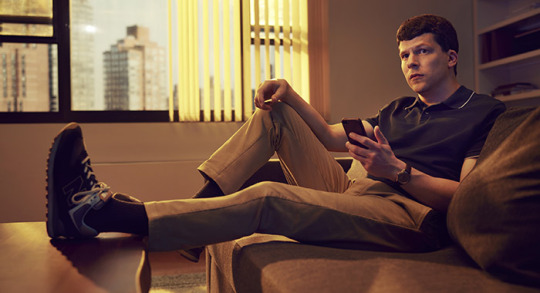
“(The cast) turned all these characters not just into humans, but into very specific humans, more specific than I ever even wrote them,”New York Times Magazinewriter Brodesser-Akner says. “Their interpretation, to me, is the ultimate interpretation … not my own. It’s like the final one. I gave them a script, I gave them a book. I answered their questions when they had them. But those [characters] are very uniquely what our actors made them.”
Below, the stellar cast shares what drew them to sign on to portray Brodesser-Akner’s characters in the Certified Fresh new series, and why they think the relationship woes and personal evolution dramas of the Fleishmans and their friends will not only resonate greatly, but could even spark viewers to action in their own relationships.
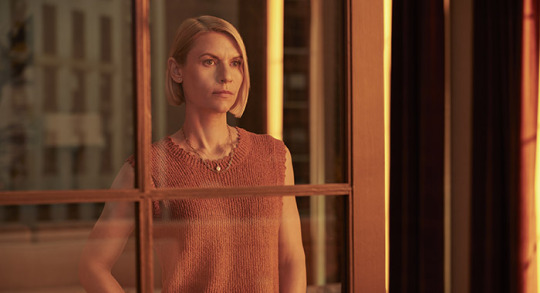
Kimberly Potts for Rotten Tomatoes: What personal connections that attracted each of you to Brodesser-Akner’s story?
Jesse Eisenberg:For me it was something very personal, which is just that I recognize this culture, this specific brand of neurosis and anxiety and need for stability and euphoria and very specific cultural touchstones. Taffy can do that great thing, which is write about her own culture in a way that is understandable to outsiders as well as insiders. So for a kind of Jewish New Yorker watching this or reading this, it feels totally accurate. What I’ve discovered is that for people who are outsiders to that culture, they feel similarly touched, similarly relating.
Claire Danes:I thought it was a wonderful kind of anatomy of a relationship. She explores the dynamic between these two people (Toby and Rachel) in such a kind of kaleidoscopic way. It’s a really thorough examination of it, and we get to experience it and reexperience it from so many different vantage points and points along their line of history. So, it’s very kinetic and a really surprising structure. I happen to be a middle-aged married person with a couple of kids living in New York City. So like Jesse, this was all immediately relevant to me. But even though I happened to be of this, the kind of microscopic point on the globe, the feelings and ideas are global and very shared.
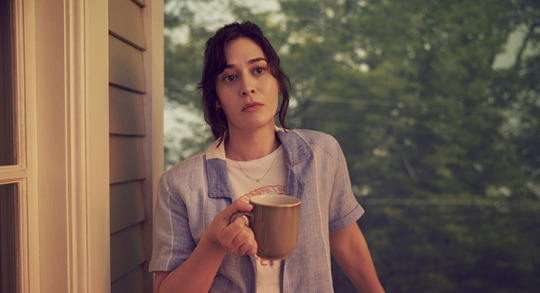
Lizzy Caplan:I had read the book and loved it. I think for me it was … really identifying with who these characters were. I feel definitely a shared history with them, just a similar — the West Coast version of their East Coast Jewish upbringing just felt really familiar, but also, all the characters were grappling with these more middle-aged problems that still feel like deep in the future for me. I don’t feel like I’m experiencing what Libby is experiencing currently, but it’s kind of a good practice to see what my future middle-life misery will look like.
Adam Brody:Well, I think Taffy’s such a wonderful writer, and I think it’s a flawless adaptation … eight episodes for the book, I feel like nothing had to be sacrificed, and at the same time, a bunch of new stuff didn’t have to be invented. You really get everything that’s lovely in the book in the show. It’s so crackling, and it’s so charming and entertaining and kind of glossy, and the show’s so cinematic that you get this wonderful kind of big cinematic, sweeping experience from this very inward-looking story.
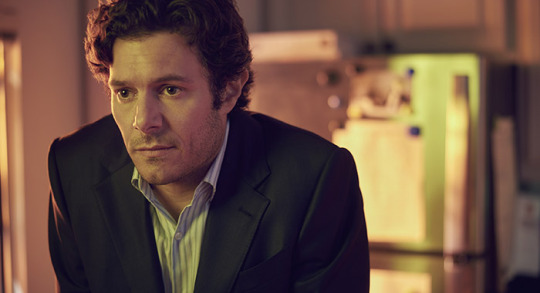
What’s the possibility of viewers relating to the characters and storylines so much that it sparks action in their own lives?
Eisenberg:Truly my favorite part of the show is that, you see Rachel through (Toby’s) perspective for quite a while, and you kind of come away with this very skewed perspective of her villainousness and her selfishness, her coldness, her unhealthy ambition … (then) the show switches perspective and you see the same relationship from her perspective. And you realize, wait a second, Toby has been aloof, he’s been sexist, he’s been unfairly asking for her commitment to a relationship that is beyond what she’s able to give … him not recognizing her real world trauma and her life’s pain. I think people will take from it that when you look at any relationship from your own perspective, you’re going to see it in a very skewed way. You’ll never judge your own behavior, you’ll judge your intentions … you’ll not give the other person the benefit of the doubt. Which is what happens in (Toby and Rachel’s) relationship. So yes, hopefully this is not like a morality tale and it’s not a show that’s preaching or sanctimonious. But yes, I suspect that people will take from this show the idea that, if I looked at my behavior from somebody else’s perspective, it might not look as rosy.
Danes:I think the characters are forced and they protest, they try very hard not to, but ultimately they have to face themselves and self-reflect. They get lost in blaming each other for a while. They’re so fixated on the other person’s shortcomings. They have to go through the morass of that before they can arrive at the very uncomfortable, but much more important, place of reviewing the choices that they made, accepting their own responsibility. And hopefully that’s what we will allow the audience to do. And I think self-reflection of that kind is a form of action, I hope.
Caplan:I think that it could. I think that’s definitely one of the goals of making art that, when you watch something, you see yourself in it, and it helps you make certain decisions in your life.
Brody:I don’t necessarily think it has to be a call for action as much as it’s comforting to see yourself and see yourself romanticized.
SOURCE
3 notes
·
View notes
Text
'Fleishman Is in Trouble' Stars Claire Danes and Jesse Eisenberg On What Makes a Marriage Successful
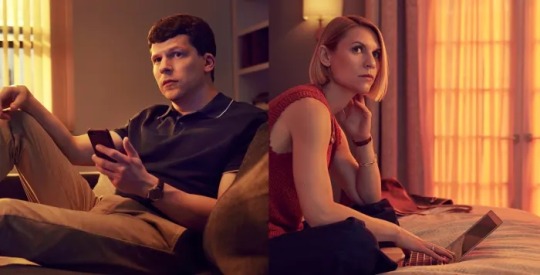
Claire Danes andJesse Eisenberg's characters in Fleishman Is in Trouble weren't lucky in love.
The Homelandactress andThe Social Networkstar play newly divorced couple Rachel and Toby Fleishman in the series adaptation of Taffy Brodesser-Akner's 2019 bestselling novel.
"What's interesting about this show is they think at the onset that they're winding up with the right person for 1,000 reasons," Eisenberg tellsParade.com in an exclusive interview with Danes. "These are like smart, analytical people who think 10 steps ahead in their business—but just couldn't foresee the cracks."
Both Danes and Eisenberg, who are married to Hugh Dancyand Anna Strout, respectively, believe that luck contributes to a successful marriage. "I think a lot of it's luck and it's also a living, evolving thing, right? I think it's an amazing way to kind of get feedback about who you are. I think it's just a natural impulse," Danes says.
"It's just how we're designed, but it's also, you know, it's something that you have to constantly cultivate and nourish and explore," she continues. "I mean, you have to be very active within it. And if you stop doing that, it might not survive, right?"
Fleishman Is in Trouble is about life, marriage, dissatisfaction and wanting to feel accepted—What was it about the show that drew you to the project?
Danes: What you said! I just thought it was kind of an amazing portrait of a relationship. Also a point in our lives, you're in this kind of mid-life zone. And yeah, seeing it in this kind of kaleidoscopic way through all these different myriad vantage points—I just thought it was a really surprising format, and a very effective one, very probing and evocative. I happen to have read the book before it was offered to me and was very moved by it, so it was an easy "yes" when it came my way.
Eisenberg: My favorite thing about it is my favorite thing about all drama, which is that it allows you to see a particular story from multiple perspectives. Sometimes that happens in kind of implicit ways where your allegiance as you're watching something kind of shifts from character to character, but in this, it happens in this very explicit way where you're watching the show, and you realize that it's being told from my perspective with my skewed version of the marriage. Then this incredible thing happens later in the series where you see the show from Claire's character's perspective, and all of those things that you thought made me the hero and her the villain are kind of switched on their head, but in a realistic way. You see the same scenes that you saw from my perspective now from her perspective, and they seem just far more sympathetic to her, and you see me as this kind of aloof, self-centered guy rather than this put-upon, sweet hero.
The show really drives home the point that there are two sides to every story. What was the most challenging part of playing Rachel and Toby for you?
Danes:For me, it was that there was this great dichotomy. She's so polished and she's so composed, like almost aggressively so, but she's actually deeply fractured under that facade of intense competence. So kind [of] balancing those two truths, I think was the trick of it for me. And also just the tone of the story is a little unusual. It's comic and also quite raw, so being able to kind of move fluidly in those different directions was an enjoyable challenge.
Eisenberg:For me some of the difficulty is, when I play a character that is quite similar to me, I find I'm far more self-critical because I know the nuances of this thing so well cause it's kind of in me ... You have like a heightened sense of where you're not being completely accurate. So I find that a struggle. But the other thing with this is that the character is similar to me and then different in some really fundamental ways.
Taffy, who wrote the book and who wrote this series, summarizes Toby at the end that he would kind of get close to being self-aware and then run screaming from it, and it was something for me as anactor—who's as aperson very self-reflective, self-critical—I don't mean those as wonderful attributes. I mean those as like kind of obsessive, neurotic attributes—but Toby has like a bit of a mental block on his own self-reflection in the way he's written. I thought, "Oh, that's really interesting," because he comes very close to being me, and then there's this strange block, and so the weird thing is that the character is so close to me. I think when people watch it who you know me they'll think, "Oh, that's like a very similar character to the Jesse that we know." But there is this strange lack of self-reflection that Taffy includes so wonderfully in the series that for me was just a struggle to relate to, 'cause otherwise he seems like a very analytical, thoughtful person.
These two characters seem totally incompatible, yet they say they never misrepresented themselves... What do you think went wrong for Toby and Rachel?
Danes: I think they had a natural kinship that was genuine. And I think they didn't know themselves very well when they entered this union. And I think what was initially comfortable was they got to certain points along the way where they were kind of challenged and stretched, and they just didn't have the personal resources to understand how to meet those challenges, certainly not together. And I think that Rachel really underestimated the trauma that she had experienced as a kid and was quite dormant, and it didn't take much to stimulate it, to activate it and when that happens she's so unmoored. It happens a couple of times, and she doesn't fully address it, and she certainly doesn't know how to bring it to Toby. And he can't see it. He can't intuit himself. There were certain critical points on the line that they didn't respond sufficiently to together. I don't know.
Eisenberg: I agree. And there's this wonderful part in the third episode, which so explicitly telegraphs the thing you had asked about, which is that like, I see her on the phone kind of yelling at somebody and I'm so, like,impressedby it. Like I'm married to this incredible woman who stands up for herself, who doesn't feel the need to apologize for everything—so different than what I conceived of my relationship in my life being. Then you see this very quick progression of her yelling at people on the phone to turning into, as he sees it, this irredeemable monster of ambition—and that's from [his] skewed, probably sexist perspective on what [he] wants his wife to be. But it's really wonderful, because you see how the thing he loves starts to turn into the thing he hates. And then similarly, when the story shifts so amazingly to her perspective, you see that my neglect of her is the thing that turns her into this thing that he thinks he didn't want.
I'd love to hear what marriage means to you and what you think makes a marriage successful.
Eisenberg:I mean, probably a lot of luck to wind up with the right person. And what's interesting about this show is they think at the onset that they're winding up with the right person for 1,000 reasons. These are like smart, analytical people who think 10 steps ahead in their business—but just couldn't foresee the cracks. And so, some of it is I guess is just luck, you know, that you wind up with the right person.
I think in the case of us personally, we feel like that happened and we feel so lucky and fortunate and, you know, it feels in some ways out of our hands. But in the show, you see that what was once a wonderful union—for a series of reasons that probably have nothing to do with the evils of these people—it just didn't work.
Danes:Yeah. I mean, I think a lot of it's luck and it's also a living, evolving thing, right? I think it's an amazing way to kind of get feedback about who you are. I think it's just a natural impulse. It's just how we're designed, but it's also something that you have to constantly cultivate and nourish and explore. I mean, you have to be very active within it. And if you stop doing that, it might not survive, right??
SOURCE
1 note
·
View note
Text
Jesse Eisenberg on the Gendered Double Standards That ‘Fleishman Is in Trouble’ Exposes
The star of the new FX adaptation also discusses why he feels embarrassed by the culture the show depicts and why he’s most comfortable playing the antihero.
NOVEMBER 16, 2022 9:30AM
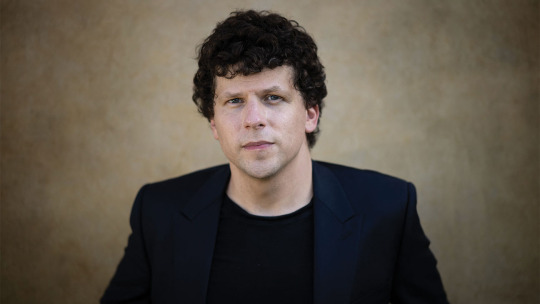
Jesse Eisenberg is a bit embarrassed to be here. It’s not because of the quality of the project he’s promoting — new miniseries Fleishman Is in Trouble is based on the 2019 novel (of the same name) that was a New York Times best-seller, longlisted for the National Book Award, and landed on every major best of the year list; the FX adaptation also stars Lizzy Caplan and Claire Danes. Rather, it’s the sheer fact that he is on display as the face of this project, the subject of interest from other people. “I’m so embarrassed that I’m a public person in the first place,” he says. Also, there are themes in the drama series that are triggering for an actor inclined to humility.
The story follows a divorce between Toby (Eisenberg) and Rachel (Danes) Fleishman, narrated by Toby’s friend Libby (Caplan). Viewers are first shown all the ways in which the social-climbing, wealth-obsessed wife has antagonized the altruistic husband, before the other side of the argument — the side that isn’t always shown in pop culture — is revealed. It all takes place on Manhattan’s Upper East Side, and while the gendered themes are universal, it particularly skewers the class consciousness of New Yorkers. (Jesse Eisenberg is a New Yorker).
“So much of this show feels embarrassingly specific to the culture I grew up with, all things I have shame around,” he says. “It can be a relief to play something familiar, but it’s also exposing the things I’ve hidden in my own life — and here I am on television feeling those things in front of everybody.”
Eisenberg spoke to THR over Zoom (from New York, of course, shortly before the show’s Tavern on the Green premiere party) about the onscreen exposure therapy and what Fleishman has to say about marriage.
How familiar with the book were you when you signed on?
I started reading the book because I had [read] so many interesting interviews with Taffy. The trick of the book is so satisfying. You’re involved in this man’s story, he’s this heroic, sympathetic guy, and then you realize that not only is this a one-sided perspective on a tragic marriage but also a long-standing trope in stories, that we feel bad for the man. We have different expectations for what a man should shoulder than what we think a woman should shoulder. And when it comes to issues around domestic challenges, family and marriage, we expect more from a woman.
What is your take on the character of Toby?
There’s a line at the end of the book, which I think is also in the series, that says, “Toby would come close to self-awareness and then run screaming from it.” My first reaction had been that the guy is completely self-aware, but I realized that he has a sense of righteousness that clouds him from being self-aware and seeing his own contributions to the fraught in his marriage. That was interesting to me, because I don’t think of myself that way. I think of myself as not only very self-critical, perhaps more than is healthy, but I blame myself first in a situation. And sorry, I don’t mean to tout my values, I just mean this is how my brain is wired. And Toby is not wired that way.
Were you still able to imagine yourself as him?
It’s a lot more comfortable for me to play the antihero than it is to play the charming guy. I just tend not to think of men in that way, as put-upon, I think of them as really in control. I don’t love the idea of male sympathy, which is one of the wonderful elements of the show: It makes the viewer complicit in that sympathy because you’re thinking God, this guy’s a victim. And then by the end you realize that’s just one version of this marriage. I felt it was easier for me to play the ending episodes of the show, which are more in line with the way I view complications in relationships: that there’s no saint.
Brodesser-Akner (also the series’ showrunner) is well known for her keen celebrity profiles of people like Bradley Cooper; did you feel like she was scoping you out?
I’m so glad I know Taffy through this experience, because there was a safe thing to talk about, which is the show. She did hit the thing right on the head for me, which is that I deflect from talking about myself by asking a lot of questions. She said if she was going to try to write a profile on me, it would be about the profile that I’m trying to do on her.
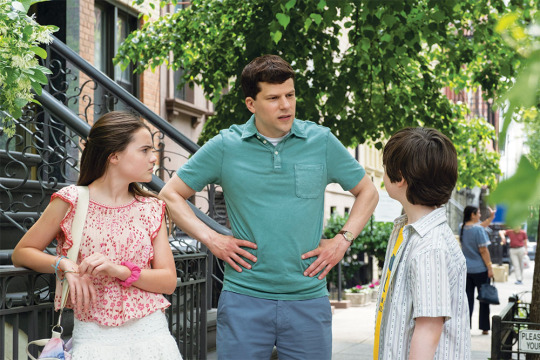
What did you think of the way the show depicts New York?
This show portrays what I call Zabar’s versus Sarabeth’s, which is fascinating to me. I’m sort of neither. I was born in Queens, and when I was 5 I moved out to New Jersey, so I’ve been on the outskirts of Manhattan culture. I’ve always had this fascination with very rich people, that they could live side by side with everyone else and have these extravagant lives. I suppose there’s a bit of cynicism because you think, “I’m an artist, I’m doing it the right way, and I hate that you have to be a billionaire to get a two-bedroom apartment now.” And all that is in the show. As my character says to his wife, “I’m a rich person everywhere in the world except the 40 square blocks you insist we live in.”
SOURCE
13 notes
·
View notes
Text
Content Warning
By Jesse Eisenberg
November 7, 2022
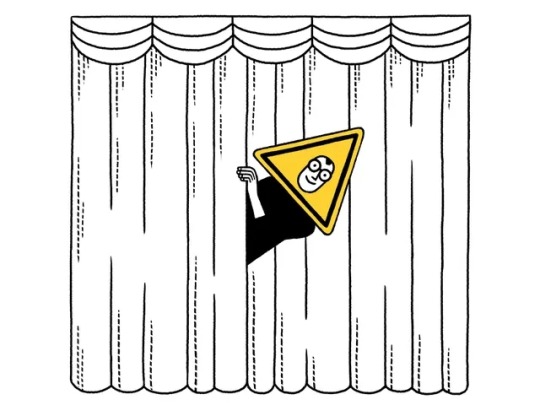
This production contains strobe lights, loud noises, and haze.
this production contains a rain effect, which impacts only the sides of the audience. Luckily, this production has not sold a single ticket on the sides of the auditorium, as this production can barely sell out the middle section.
this production contains strong language. But not in the literary sense. There are no memorable lines, witty jokes, or pithy observations whereby characters muse in a way that allows the playwright to make a larger point about the human experience.
this production contains a scene in which the actors will be smoking. It may appear that one of the actors, the young man playing Cousin Jude, has never actually smoked a cigarette in his life, even though his character explicitly says, “I’ve been smokin’ my whole life.” You’d think the actor might have done the bare minimum of preparation for the role—it’s his first job, he’s straight out of Fordham—but he apparently thought he could wing it. This is just par for the course in this production.
this production uses dry ice to indicate that a scene is either a happy dream, a scary dream, a flashback, a passage of time, or that it takes place in Europe.
this production contains two characters who appear nude. That’s actually a bit misleading. It’s the same character, but at different ages. The first time we see the character nude, he is played by the lithe young man who plays the cop on that TV show. Presumably, most of you are here to see this actor in this nude scene. If you are sitting in the orchestra, you will get the fullest view. If you are sitting in the balcony, it’s not a complete washout, but I recommend moving down to the orchestra. There will be many available seats. In the second act, the same character is nude, but he is now played by Peter Jablownski. Peter is a member of our repertory company, and this is his forty-third year with us. If you make it to the second act, you’re going to want to head back up to those balcony seats.
this production contains confusing double casting.
this production contains an uncalled-for musical number.
this production contains unconvincing stage combat, a poor depiction of what it’s like to have diabetes, and a didactic speech about Lenin.
this production contains a vast misunderstanding of addiction.
this production contains a shocking ending. Although, to be clear, it’s not a good shock. It’s not the kind of shock where you’re invested in a character or a story and then, when things take an unexpected turn, you’re left with a greater understanding because you realize that the characters had no other choice. This is not Miss Julie walking offstage with a razor or Willy Loman crashing his car or Oedipus gouging out his own eyes (although doing that yourself might cross your mind during this production). It’s the kind of shock that makes you think, Have I been watching a different play for the past two hours? Wasn’t the grandmother supposed to be dead? How did they all wind up in Las Vegas, and why does the doctor keep mentioning bowler hats? It’s the kind of shock that tells you that the director got the job only because his dad runs the theatre company, and apparently nothing matters in this life except having a powerful father who runs a theatre company or being the third lead on a cop drama. It’s the kind of shock that indicates that the playwright’s mother was right and she should just go back to law school, and that having a career in the arts is both unstable and incredibly selfish.
this production will run four and a half hours, with one five-minute intermission. ♦
SOURCE
3 notes
·
View notes
Text
For ‘Fleishman Is in Trouble,’ Claire Danes and Jesse Eisenberg Say I Do
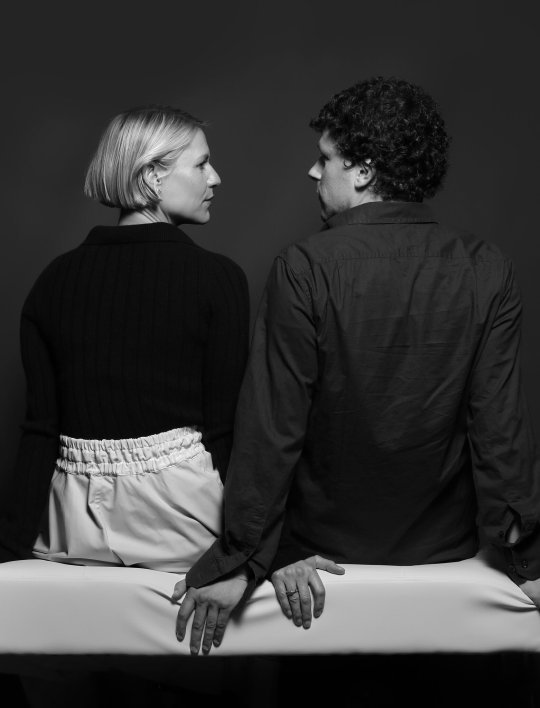
In “Fleishman Is in Trouble,” Claire Danes and Jesse Eisenberg play two halves of a splintered couple.Credit...Thea Traff for The New York Times
The actors share a doomed union in this new FX series. In a joint interview, they discuss their own marriages and how it felt to depict such a contentious one.
By Alexis Soloski
Nov. 4, 2022
Marriage, the actress Claire Danes insisted, means sacrificing certain freedoms.
“That’s one of the great gifts of it,” she said. “But sometimes that shoe feels a little snug. There are moments when you’re like, ‘Actually, I would go in a different direction here.’”
“For me, I’m just so happy to have a shoe on,” said Jesse Eisenberg, her work husband.
In “Fleishman Is in Trouble,” FX’s limited series adaptation of Taffy Brodesser-Akner’s 2019 novel, Danes, 43, and Eisenberg, 39, star as Rachel and Toby Fleishman. Long married and recently separated, the Fleishmans — she’s a high-powered talent agent; he’s a hepatologist — inhabit the upper echelons of Manhattan’s Upper East Side. The first two episodes arrive on Hulu on Nov. 17, with a new episode each Thursday for six more weeks. (Brodesser-Akner, who wrote seven of the eight episodes, is a staff writer for The New York Times Magazine.)
On a recent afternoon, Danes (“Homeland,” “The Essex Serpent”) and Eisenberg (“The Social Network,” “When You Finish Saving the World”) met in an office at FX’s Manhattan headquarters with a “Fleishman”-like view of mid-rises and water towers. Danes is married to the actor Hugh Dancy, Eisenberg to the educator Anna Strout. But for about six months — despite having met only once more than a decade before, when Eisenberg was extremely high — they had to pretend to be married to each other in a show that shadows one union from early courtship to eventual implosion and beyond, tracing its breakdown with granular specificity and occasional double vision.
The novel argues that “beyond your point of view lies an abyss with a bubbling cauldron of fire, and that just beyond that abyss lies your spouse’s point of view.” And so the show stages some scenes from Rachel’s point of view and some from Toby’s. (The pilot was directed by Jonathan Dayton and Valerie Faris, executive producers who are themselves married.)
How was it playing a couple locked in a cycle of neglect, reproach and retaliation? “Very comfortable actually,” Danes said, kicking off her Jimmy Choos. Eisenberg, on the opposite end of the sofa, agreed: “She’s the greatest.”
They had a terrific work marriage, Danes confirmed, while “depicting a very bad, unhealthy, unnatural one.”
In an hour’s chat, as the autumn light outside the window turned the city golden, the two actors discussed marriage, divorce and dodgeball. These are excerpts from the conversation.
Did you know each other before this?
JESSE EISENBERG We did.
CLAIRE DANES I didn’t remember.
EISENBERG It’s a funny story.
DANES Tell the story.
EISENBERG My [future] wife took me to some benefit thing in Brooklyn, probably 15 years ago. I was the most stoned I’ve ever been. I was just talking to this woman, and I’m like, “I’ve met my soul mate.” I ran over to Anna. I was like, “That woman is amazing.” She was like, “That’s Claire Danes, good luck.”
So you met once. Then suddenly here you are, married. This show is such an intimate appraisal of a marriage. Can anyone on the outside ever understand what goes on inside a marriage?
DANES I think the people in it barely understand, and it changes over time. It is an astonishing invention. It’s imperfect. But I personally don’t have a better model. I am attracted to it and fascinated by it and find it a very worthwhile pursuit. It’s a way to continue exploring who you are and where you are.
EISENBERG It’s also an attractive prospect for me. The alternative is not interesting or desirable. My wife and I have had probably the same dynamic for the many, many years we’ve been together, the same arguments and the same joys. The TV show presents that. Except that this is a doomed marriage.
DANES In my actual relationship, when we were met with a certain level of stress that we were ill equipped to cope with, we had to develop techniques and strategies and skills to become a better functioning couple. Our characters were not able to do that. They got swallowed by points on their continuum that were just too hard. And they didn’t have the self-awareness or the self-possession or the guts to be honest with each other. They just retreated further and further.
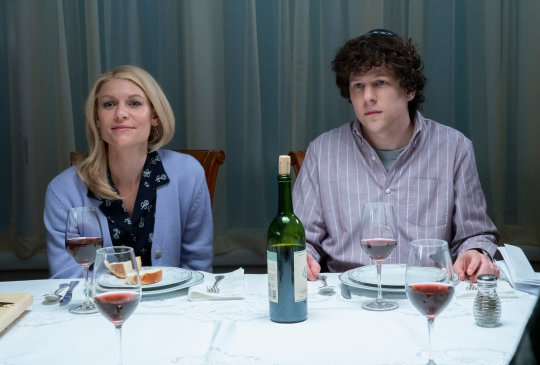
When you were preparing for these roles, did you sit down and map out what this relationship had been, what their history was?
DANES Not really. We had a few dinners with Taffy and the cast, which were valuable. And we had rehearsals, abbreviated but dense, which were really effective because of these exercises that Jon and Val offered us. Writing exercises, primarily, which was very annoying, because Jesse is an actual writer and an excellent one. I was like, this isn’t fair.
EISENBERG I thought iambic pentameter was appropriate!
DANES But it did provide a lot of insight. Then we played dodgeball. I was wearing clogs, which I don’t recommend.
What do you think Rachel and Toby saw in each other in the first place?
DANES They do, actually, really like each other. They have easy, happy chemistry. They probably share a sense of humor. And they did have similar values once upon a time. He was her first true friend ever. I don’t think she would have left him had he not insisted on it.
EISENBERG The thing that attracts you to the person is what’s different about them. But that’s also what becomes their undoing, because the chasm between my character’s value system and hers is too wide.
DANES Are your parents still together?
EISENBERG My parents are married.
DANES My parents, too. They’ve been married for 55 years or something like that? They met at 18. At RISD [Rhode Island School of Design]. And they’re still very in love.
So how was it being married to each other for the camera?
DANES Very joyful. I love working with Jesse. He’s very gifted and very present and profoundly, almost pathologically generous — truly, really. And just an amazingly playful partner. It was so much fun tearing into each other.
EISENBERG That felt right, too. It felt good.
DANES What’s extraordinary about the novel, and now this interpretation of it: It’s very comic, but it’s also quite raw and wrenching. Threading that needle is fun, but a challenge. Rachel was tough for me, because she was so intensely polished in some ways and so profoundly fractured in others. Figuring out how to coordinate that was the trick of it. There are episodes where we hear his account, then we get hers. We shot those scenes, one after the other — that was very strange. It was like an acting exercise. It’s a matter of degrees.
EISENBERG Exactly. She would be 10 percent more hateful, more stubborn. Then my character would be more aloof and unaware of her pain.
So these were small changes.
DANES But consequential.
Do you think you could be married to each other in real life?
EISENBERG When I met Claire at that benefit, I immediately ran over to tell my wife that yes, I could be married to that person.
DANES And he was right, in a way. A little prescient there.
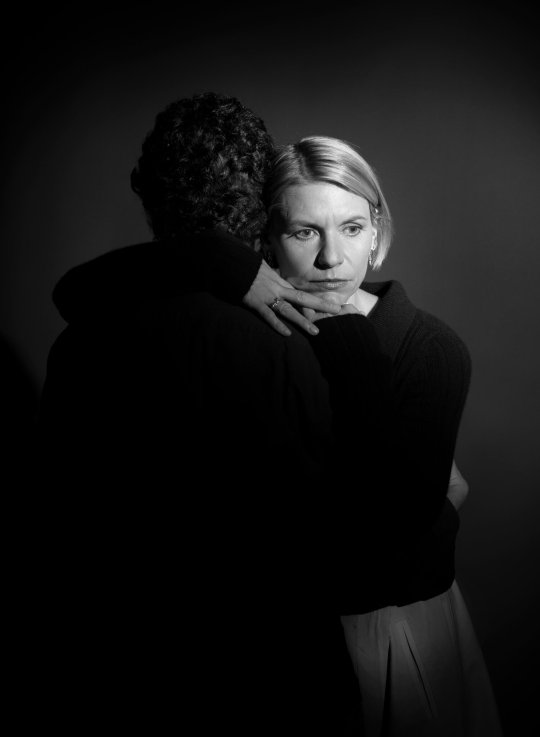
Parts of the show are very light, very funny; other parts are more intense. Did you take any of that home with you?
DANES It’s funny: With “Homeland,” the character was so very other, so alien, it was easy to compartmentalize. I got a little cocky about it. This one was a lot closer, a lot more reminiscent. Playing a married person with kids, I was at greater risk of taking it home than I have been with other projects, which surprised me. I had a couple of fights with Hugh, and I was like, “Whoa, this is not to do with us.” So that was humbling. And mildly distressing. But once I became aware of it, it was fine.
EISENBERG I had the exact same thing. I would have these arguments that end with, “You’ve always done this,” which is how Toby accuses Rachel. You spend 12 hours a day having a certain very specific resentment. You take that home and the circumstances overlap enough to the point where you might accuse your loving, sweet partner of the same thing.
DANES But the appreciation for Hugh was also so heightened, because I was living in this hell. It was so painful and so terrifying, deeply destabilizing. We really do need relationships. We can’t really cope in isolation. It’s just not how we function. There’s something very moving about that.
EISENBERG As actors, you sometimes get to run these social experiments, playing a character that might overlap with you enough to give you a sense of what you would be like in these circumstances. This was a great example, because I’m quite similar to Toby.
DANES It’s a real privilege to be able to explore those particularly daunting, intimidating, scary zones, but in the land of make-believe. So relatively safely.
So did you perform the thought experiment of what life would be like if you were suddenly single?
DANES Very, very rarely. I don’t know. Doesn’t seem good.
EISENBERG I was just thinking about it because in terms of the show, he’s dating again. And he’s completely untethered. It didn’t feel tantalizing in any way — it felt exhausting and unsatisfying. I didn’t experience singleness in the modern era, where you’d be using technology to meet people. It increases both the options and paranoia.
DANES I would find that particularly intimidating. And unnerving. I don’t think I would do that very well.
SOURCE
19 notes
·
View notes
Text
Jesse Eisenberg Talks About Shifting From Acting to Directing, Working With Julianne Moore and Emma Stone in ‘When You Finish Saving the World’
Midway through the Sarajevo Film Festival, local fest publications seized on a quote that Jesse Eisenberg had given in Q&As that week: Sarajevo, the actor-writer-director said, is his favorite city in the world. From some stars, that would be an empty soundbite; from Eisenberg, who stayed at the festival for several days to explore local culture and history, it was entirely heartfelt.
The festival, meanwhile, returned his love, presenting him with an honorary Heart of Sarajevo Award, and hosting an open-air screening of his directorial debut, “When You Finish Saving the World,” a bittersweet satire of generational conflict, and the contemporary nuances of charity and activism. We invited him to the Variety Lounge presented by Sarajevo Film Festival and BH Telecom to talk through the challenges of switching from acting to directing, working with Julianne Moore and Emma Stone, and the most unexpected of his upcoming roles.
“Maybe unconsciously I thought I could direct a movie, but I never allowed myself to think of it explicitly, because it just feels like such a cliche,” says Eisenberg — who was Oscar-nominated in 2011 for playing Mark Zuckerberg in David Fincher’s generation-defining “The Social Network,” but this time opted to stay behind the camera. Adapting a story he originally conceived as an audio drama for Audible, he retained “Stranger Things” star Finn Wolfhard from the audio cast, but brought on Moore as the brittle do-gooder mother of Wolfhard’s socially awkward teen.
Directing actors, however, brought out his nerves. “I’ve received so many bad notes in my life as an actor,” he explains. “I was so unnecessarily fearful that I’d be giving them to my actors.” With Moore, however, he hardly had to worry: “She’s the best,” he says simply, adding that like him, she gravitates toward characters who are “very cold and very warm at the same time, their coldness [coming] from their own insecurities rather than their own malice.”
The film also marks an unlikely reunion between Eisenberg and his old “Zombieland” co-star Stone, who likewise flexes her off-screen muscles, having produced “When You Finish Saving the World” with her husband Dave McCary. Despite branching out like his, however, Eisenberg is eager to return to acting, and speaks with particular excitement of a surprising upcoming role in a film from fraternal directing duo David and Nathan Zellner. “I play a Sasquatch: full makeup, full body hair, no lines. I grunt, but no lines,” he says with a laugh. “I’m so looking forward to this.”
SOURCE
3 notes
·
View notes
Text
Jesse Eisenberg On The Return Of Lex Luthor: “I’d Be Shocked If I Wound Up In A DC Movie – But It Would Be A Pleasant Shock”
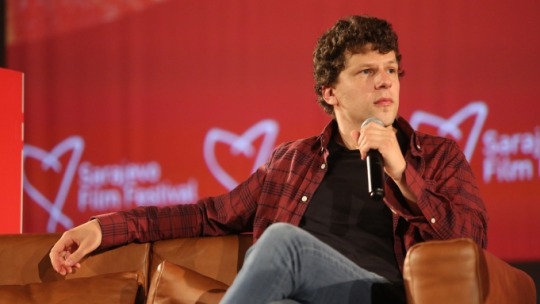
Speaking to an enthusiastic crowd at the 28th Sarajevo Film Festival after screenings of his directorial debut When You Finish Saving the World, Jesse Eisenberg covered a lot of bases, from his introduction to acting as an anxious teenager to his dislike of the sitcom Friends (“My sister loves it, and we get into arguments all the time,” he said. “Because no one talks that way, and there’s not a group of six people that are all that good-looking and all that funny”). Eisenberg also expressed dismay at the response to his portrayal of Lex Luthor in the 2016 blockbuster Batman V Superman: Dawn of Justice. “I felt very personal about it,” he said. “The writer, Chris Terrio, is a very serious writer, and he’s a very emotional person. He thought a lot about my character, and I thought a lot about my character too. I talked with my acting coach about the character a lot, about his backstory with his father and his emotional life—and then people hate me.”
Speaking to Deadline afterwards, Eisenberg clarified that he would not rule out a return to the DC or even Marvel world if called upon. “I’d be shocked if I wound up in a DC movie, but it would be a pleasant shock,” he said. “Listen, I’m not a comic book fan. To me, it was not playing a role that I’d envisioned since childhood. To me, it was a chance to play this great character that this great writer wrote, and I loved doing that. So, to play it is a joy, and to not play it isn’t something that I’m going to be ashamed to tell my kids about, because that is not an important genre in my life, even though I loved doing that movie.” So he would still do a superhero movie? “Yeah. Because as an actor, you do all kinds of different things, and sometimes great roles show up in really commercial things and sometimes terrible roles show up in independent films.”
For the time being, however, Eisenberg is keeping his diary clear, as he prepares to shoot his next film, A Real Pain, in Poland. “The story is about two cousins who have grown apart,” he explained, “and they go on a heritage-slash-Holocaust tour after the death of their grandmother. It’s about their lives and their little struggles, as opposed to the bigger struggles that they’re facing, and trying to juxtapose how we think about modern pain versus how we think about the pain of our ancestors. Our ancestors were killed, and our struggles are so minor, comparatively. The movie kind of asks the question, ‘Are [those minor struggles] also valid?’”
The writer-director’s co-star in the film will be Succession star Kieran Culkin. “I always thought of him for the role,” said Eisenberg. “I actually haven’t seen Succession, but my little sister, who I send everything I write to, had. When she read the script, she said, ‘You have to give it to Kieran.’ I was like, ‘Oh, my God, I’d love to, he’s just phenomenal.’ He does Kenneth Lonergan plays in New York, and I have real love for those plays.”
Eisenberg not having seen Succession isn’t entirely surprising, given that he doesn’t even see his own movies. But it’s perhaps a little remarkable that he doesn’t keep tabs on Facebook founder Mark Zuckerberg, whose portrayal brought him an Oscar nomination for 2010’s The Social Network. “I guess I don’t, because I don’t have a Facebook page,” he mused. “The stories are typically meaningless to me. I notice sometimes when a story comes out about Facebook in the news, but I think people just worried that their data is being mined or sold. I feel a little chuffed that I never got a Facebook page.”
Despite the many plaudits for David Fincher’s film, Eisenberg doesn’t get much recognition from the public for it. “When I go to the airport,” he said, “people have seen me in Now You See Me. As great a movie as it is, The Social Network is still a drama. It’s not a popcorn kind of movie. Even though it’s considered one of the greatest movies [of recent times], it’s just not a movie that people shout at me about from across the room. People shout at me from across the room because I was in a movie about magic.”
Fans off the Now You See Me franchise will be pleased to know that a third is very likely on the way. “They’ve been trying,” he said. “but I think it will happen sooner rather than later. It’s such a beloved franchise. I only know this because I’m in it, but you feel it. I don’t know why that is, because my finger’s not really on the pulse of culture, but I feel, as a person involved with it, that it’s something that people really love, and I know that the people who produced the movie feel that too.”
All this recent activity will presumably make up not just for the disappointment of Batman V Superman but also for the crushing rejection that happened during the pandemic, when his work was turned down by satirical website The Onion. “I got very, very close,” he said. “They give you a probationary period, so you submit 10 ideas a week for a number of weeks. I got very close twice, and then, ultimately, I didn’t make it. It’s very competitive.” How hard did it hit? “Listen, I’ve had every advantage in my life because of being in movies. This experience proved to be completely useless during this time. They don’t have bylines—no one knows who writes these things—so for me to be a famous actor is completely meaningless. In a way, it was a humbling experience, because you kind of learn, ‘Oh, this is the way the world would react to me were I not in movies.’ Which is to say that I’d probably get rejected multiple times.”
SOURCE
1 note
·
View note
Text
Jesse Eisenberg za Klix.ba: Bitno je snimati filmove o ratu, ali ne doprinositi podjelama
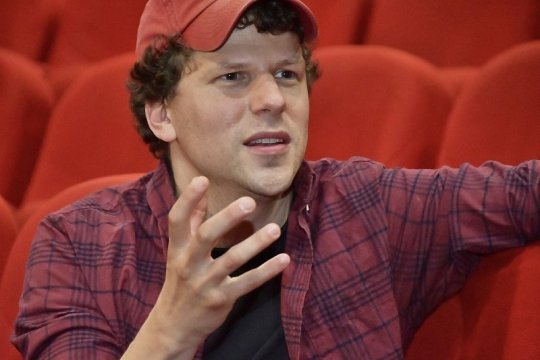
Foto: I. Š./Klix.ba
Američki glumac Jesse Eisenberg je nedavno dobio Počasno Srce Sarajeva na 28. izdanju SFF-a. Tom prilikom je za Klix.ba govorio o svojoj povezanosti s glavnim gradom naše države te detaljima iz karijere.
Između ostalog je glumio u filmu "The Hunting Party" reditelja Richarda Shepera, koji govori o hvatanju ratnog zločinca po imenu Dragoslav Bogdanović (fiktivno ime) u Bosni i Hecegovini. Eisenberg smatra da je bitno snimati filmove koji govore istinu o ratu, politici i socijalnim problemima.
"Podrazumijeva se da svako ima svoje mišljenje o gotovo svakoj temi. Kada je riječ konkretno o politici, smatram da trebam glasno reći svoje mišljenje ukoliko mogu pomoći. Međutim, ukoliko sam svjestan da ću time doprinijeti podjelama u društvu, onda istupanje u javni prostor nije dobra ideja", rekao je.
Glumac je zatim naveo da osjeća snažnu potrebu da bude socijalno angažovan i to pokušava uraditi na svaki mogući način.
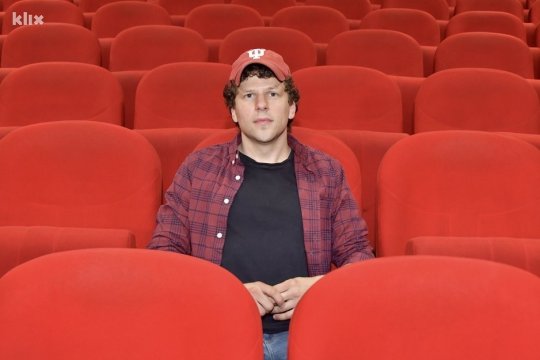
Poznato je da je Eisenberg izuzetno privatna osoba, a u nekoliko navrata je spomenuo da se još uvijek bori s anksioznošću.
"Kada je prije nekoliko dana na SFF-u ispred tri hiljade ljudi prikazan moj rediteljski prvijenac 'When You Finish Saving The World', uhvatila me panika jer nisam želio razočarati publiku. Uprkos tome, naravno da mi je bilo drago što sam stigao u Sarajevo. Volio bih da ovdje mogu ostati naredni mjesec i moći se u potpunosti posvetiti svakom događaju u okviru SFF-a. Ovako sam sve 'zadatke' morao uraditi u roku od pet dana i konstantno sam u nekoj žurbi", ispričao je.
Želi se ponovo vratiti u Sarajevo kada se bura stiša i kada bude imao više slobodnog vremena.
Na pitanje je li mu draže biti glumac ili reditelj, odgovorio je:
"Dok sam režirao 'When You Finish Saving The World', u nekim trenucima sam bio frustriran zato što ne glumim u njemu. Znao bih šta tačno trebam uraditi da scena bude savršena. No, radio sam sa sjajnim glumcima i naravno da sam ipak uživao u svom prvom rediteljskom iskustvu. Zapravo, u suštini volim i glumu i režiju i ne mogu odabrati favorita", zaključio je.
SOURCE
0 notes
Text
Jesse Eisenberg za N1: Vratit ću se u Sarajevo, to je nevjerovatan grad
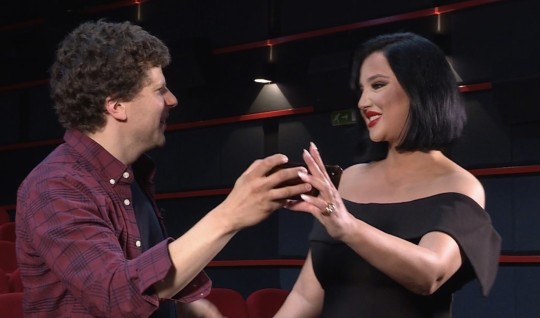
Holivudski glumac i režiser Jesse Eisenberg ovogodišnji je dobitnik nagrade Počasno srce Sarajeva, a srce publike osvojio je izjavom kako je Sarajevo njegov omiljeni grad na svijetu. U razgovoru za N1, Eisenberg otkriva šta ga to fascinira u Sarajevu, te kakve poruke nosi iz bh. prijestolnice u svijet. Govorio je i o tome kako se pripremao za ulogu u filmu 'The Hunting Party' s Richardom Gereom, o ratu u Bosni i Hercegovini. S Eisenbergom je razgovarala Ika Ferrer Gotić.
Kazali ste jednu stvar koja je dotakla publiku, reakcije su bile snažne. Iznenadio si izjavom da je Sarajevo tvoj omiljeni grad na svijetu. I svi su bučno reagirali, i bio si iznenađen. Kaži nam, zašto je to tako?
Bio sam iznenađen jer sam pretpostavio da se mnogi osjećaju tako. Ovo je najzanimljiviji grad sa svojom mješavinom kultura, arhitekture, kuhinje i historije koja je u jednom momentu bila tragična, ali i prelijepa, mješavinom civilizacija. Dolazim iz američko-židovske porodice, putovali smo širom Europe i mogu se poistovijetiti s tom vrstom bh. iskustva integriranja u različite kulture, i osjećam kako je ovaj grad dovoljno neobičan da bi bio zanimljiv, ali i dovoljno poznat da se ugodno osjećam tu.
Već si bio tu više puta, a nismo uopće znali za to. Čak i kad si stigao u nedjelju niko nije znao, prošlo je nezapaženo. Da li si iskoristio vrijeme da provedeš malo vremena nasamo, s porodicom, sa suprugom?
Nosio sam šešir pa sam bio nezapažen. Odavno sam htio tu dovesti svoju suprugu. Ona je putovala širom svijeta, i ja sam putovao, ali samo zbog nje, vodi me posvud okolo. Voli posjećivati nova mjesta, tako da sam joj govorio ‘moraš otići u Sarajevo’, a ona je odgovorila ‘ali ti si već bio tamo’, a ja sam bio uporan ‘vjeruj mi, moraš vidjeti taj grad, nevjerovatan je’. I zaista je sretna što je tu. Svake večeri smo u čudu kako nevjerovatni su građani, isto tako koliko naš sin bi želio opet doći tu.
Izvrstan si ambasador Bosne i Hercegovine.
Hvala puno.
Kakve poruke nosiš sa sobom odavde? Šta obično kažeš ljudima kad te pitaju da li si bio tu? Znamo za rat, ali šta im još kažeš, da je sad to drugačije mjesto 28 godina kasnije?
Da, bio sam tu prije 15 godina i osjećao sam se isto kao i sada, ovo je jedno mjesto na kojem si toplo dočekan. Rekao bih da postoje dva najzanimljivija mjesta na kojima sam bio, jedno od njih je Sarajevo. Postoji nešto u ovom gradu što je jako neobično, zanimljivo, također za mene kao američkog Židova, čija se porodica borila kroz ratove i slične stvari, ima nešto u tome kada ljudi izađu s druge strane konflikta, neka vrsta obzirnosti, topline, egzistencijalne analize, mogu se poistovijetiti s tim
Imaš to veliko interesovanje u ljudska ponašanja, društvena ponašanja, i to vidimo kroz tvoj posao. Baš tokom priprema za ovaj razgovor imala sam priliku vidjeti tvoj film Resistance gdje igraš ulogu Marcela Marceaua, i zadnja scena zaista ostavlja utisak. I to možemo osjetiti u tebi. Sada postaješ neko. Ti i ja smo ista generacija, odrasli smo uz glumce koje smo gledali kao svoje heroje, ugledali smo se na njih, a sada si ti postao taj glumac, ta osoba. Ulažeš se u svoj posao. Imam dva pitanja u vezi s tim, prvo postaješ uzor mladim osobama, razgovarala sam s nekima od njih i rekli su kako im šalješ poruku, inspirišeš ih da budu ono što žele biti. I druga stvar, kada ulažeš toliko u rad, da li ti to oduzima dio tebe, da li pomalo živiš s tim likom čiju ulogu igraš, jer je duboko emotivno?
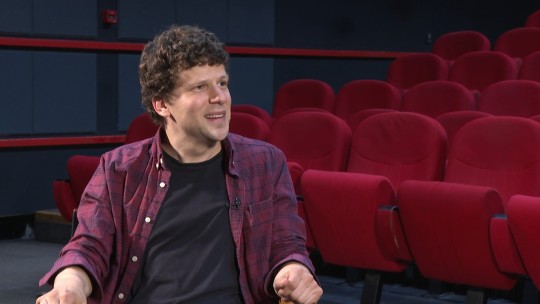
Dakle, to je probudilo nešto u tebi?
Da, znate svako dijete razmišlja o Holokaustu, čita knjige o tome, ali rijetki to ponovo prožive u Njemačkoj na snimanju i radi se o nadrealnom psihološkom iskustvu gdje se suočavate sa prošlošću svoje porodice na vrlo opipljiv način.
Snimio si i film The Hunting Party, jedan od filmova s Richardom Gereom kojeg su Bosanci gledali. Mislim da si bio odličan u ovom filmu. Da li je to bio prvi put da si došao u dodir sa bh. historijom?
Da, nisam imao pojma.
Nisi znao šta se dešavalo? Kakva je bila tvoja reakcija, kako si primio to tada kad je film izašao 2007.?
Sjećam se 1993. godine. Ja volim košarku, znate svi ti košarkaši, Dražen Petrović, Vlade Divac, Toni Kukoč, i znao sam da su odavde, i sjećam se da sam prolazio pored hrvatske crkve u New Yorku. Kada sam pročitao scenarij za taj film, sve je bilo novo za mene i onda sam malo istraživao. Ta historija je tako zanimljiva i tragična i fascinirajuća. Kad sam stigao tu da snimamo film znao sam sve, postao sam ekspert za Balkan, jer sam jako puno istraživao. Također su nam poslali BBC-jev dokumentarac Smrt Jugoslavije i tu seriju sam pogledao pet puta, vrlo dobro je napravljena.
Jako dobro se pripremaš za uloge.
Da.
Istražuješ i sve to, i nosiš to dalje sa sobom. I sretni smo što te imamo. I vidjeti te kako primaš Počasno srce Sarajeva će ostati zaista posebno, i to kako si se ti osjećao i kako su te Sarajlije prihvatili, zaista te vole.
Hvala puno, to je obostrano, i osjećam se sretno. Želio sam se vratiti kao turist, šetati gradom i pokazati supruzi ovo divno mjesto, ali umjesto toga vratio sam se da primim ovu počasnu nagradu, to je nevjerovatno.
Da, nevjerovatno je. Htjela bih ti se zahvaliti, znam da nam vrijeme ističe, toliko je još pitanja i nadam se da ćemo imati priliku sjesti i razgovarati.
Ti si tako velikodušan novinar, hvala ti.
Hvala tebi, ti si velikodušna osoba. Hvala ti što si bio tu s nama, što si doveo proodicu tu i što pričaš u ime ovog divnog grada koji te uistinu voli. Hvala na gostovanju.
Hvala na pozivu.
SOURCE
0 notes